My family and I would like to thank you for being here.
My father grew up in a warm and loving family in Leaksville, North Carolina, and had the support not only of his parents, but of his three brothers and one sister. He outlived all of them, but their children and grandchildren are here today from all over the country, and that would have meant a lot to my father.
And we would like to thank the Wake Forest Community for hosting such a wonderful gathering. It would not have been lost on my father that there is BBQ waiting outside on the quad, so I will do my part to keep things moving.
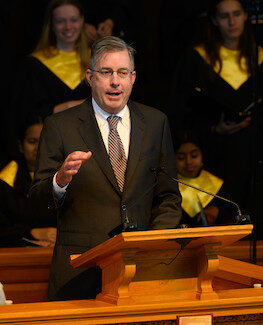
Edwin G. Wilson Jr.
But I do want to take a minute and tell you a little about my father. In particular, his kindness, his sense of honor, his courage, and what he was like as a father.
I was in court in Wilkes County one time and a lawyer said to me, “Your father once told me something I have never forgotten. He told me to be kind and be honorable.”
Be kind and be honorable. Pretty good advice.
My father was kind. I bet almost everyone here could tell a story of how he spoke at your wedding, or came to your concert, or wrote you a note. Maybe he got you in Wake Forest. Maybe he kept you in Wake Forest!
But today I am going to talk a little more about being honorable. I remember being a young boy and saying to him one time, “Have you ever lied?” And he said yes. It was 1943. He had two brothers fighting in the Army in Europe. Both brothers, Thomas and Warren, would ultimately fight at the Battle of the Bulge. He wanted to go.
During the interview with the Navy, he was asked if he had ever had asthma. He lied and said no. He had bad asthma as a child. But he wanted to go. He didn’t even know how to swim. He had never even been in a rowboat. But he had watched the war unfold.
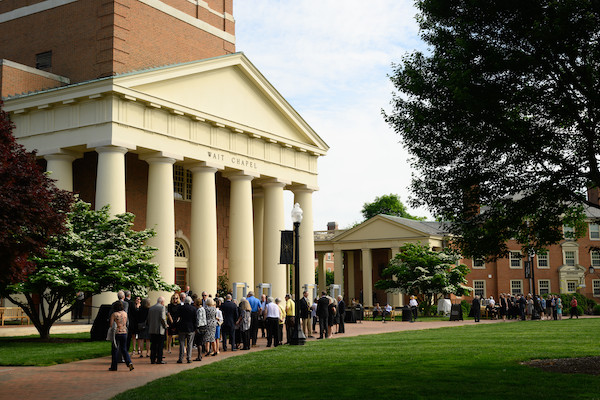
The day he left for college in 1939 was the day Nazi Germany invaded Poland. In 1940, his uncle had taken him to the University of Virginia to hear Franklin Roosevelt speak. He heard Roosevelt say, “Every now and again in the history of the Republic a question presents itself—a question that asks, not about the future of an individual or even a generation, but about the future of the country, the future of the American people.” So after graduating in 1943, he joined the Navy.
My father said he learned more about leadership in the military than anywhere else. He served with men from all over the country and saw the heroism in all of them. He saw the world. Midshipman school in Chicago, submarine chaser school in Key West. Through the Panama Canal to San Diego and Pearl Harbor. And on to the war in the Pacific.
He survived the war, survived a major typhoon where he watched other ships go down, and ultimately became captain of the ship. He came home. His brothers came home. They didn’t talk a lot about all of this. I think a letter from his brother during the war summarizes something about all of them: His brother Thomas parachuted into Normandy with the 82nd Airborne during D-day and landed behind enemy lines. Thomas wrote to him after D-day: “You may have heard we landed in France this week.”
My father absolutely did not like a certain kind of patriotism. I remember being at a basketball game during the Persian Gulf War. A man in a gorilla suit went running around the coliseum whipping everyone into a frenzy. He climbed up on to the back of the basketball goal and unfurled an American flag. The place went nuts. My dad sat there with his arms crossed. I said, “What’s wrong?” He said, “I just don’t like that sort of thing.”
And yet. Once my friend Brad Wood researched the name of the ship my father had been on, the USS Raymond. And he had a ballcap made with USS Raymond written on it. We went to Disney world and my father was wearing the hat. I led him though the ticket turnstile. When I turned around, he had tears streaming down his face. I said, “What’s wrong?” He said, “That lady who took my ticket said, ‘Thank you for your service.’”
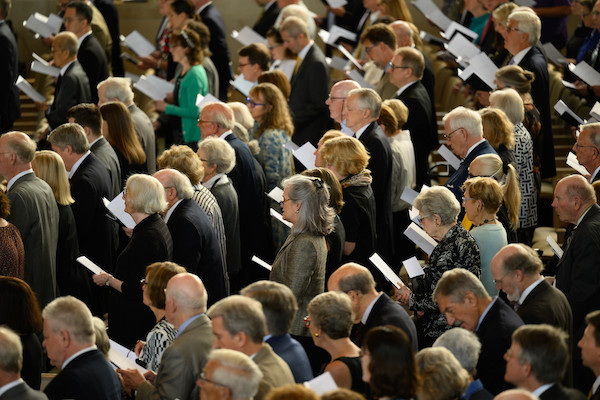
I think it was the war that partly made my father who he was and led to these next things I am going to talk about. I think you survive something like that and come away with a renewed concept of who you are and how you are going to live.
My father could be — how shall I say this? — sort of other worldly. Certainly on financial matters and most practical things. That had certain advantages.
Once when I was in my teens, my friend Burton Shields and I got into some trouble in town. My father, on hearing the news, simply remarked, “Oh, lost innocence.”
I once short sheeted my parents’ bed. My mom came down and discovered my father sleeping sideways on the bed. I escaped punishment because my mom was mad at my dad for not noticing, not that the bed had been short sheeted.
He cared little for money and in fact believed firmly that “The love of money was the root of all evil.” I doubt he could tell you the price of gas. You would have never discussed with him buying a car, opening an IRA, or making a down payment on a house. And yet, once I found a set of about 24 volumes of TR writings signed by his wife. It was about $1500. I called my dad to ask what he thought. He immediately said, “You have to buy it.” I know many of you went to him seeking career advice. I am willing to bet he never said about a job, “How much does it pay?”
I had a great job in Washington after college and decided to quit and travel to Africa. My father never said a word. After all, hadn’t Joseph Conrad gone to Africa and written Heart of Darkness? Hadn’t Lord Byron fought in Greece? He never asked about vaccines or how I was going to pay for it. His main contribution was to give me a set of books to take. I still remember them. In fact, my son, Buddy, who is not with us today because he is in Africa, has some of them with him: The Brothers Karamozov, The Seven Pillars of Wisdom, and The Decline and Fall of the Roman Empire. My contribution to the trip was Lonesome Dove.
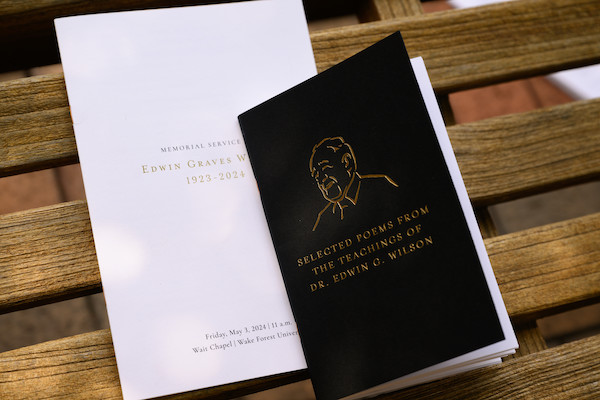
Not long after 9/11, I joined the Army. I came home with my new wife and said at the table, “Well, I joined the Army.” My mother looked at Laurie and said, “Can’t you do anything with him?” My father simply said, “I understand.” What more could I have asked for? Not “What will happen to your law practice?,” “But you just got married,” or “You could be killed.” He just simply said, “I understand,” and somehow I knew I was doing the right thing. I’ve heard from many of you over the last few weeks that he said the same thing to you at a pivotal moment in your life: I understand.
I think my mother and sisters and I would agree that my father was the most fun when he was away from Wake Forest. I think it was then that he was able to relax and enjoy the little things more: Christmas, trips to Russia and England and Maine and France. And he would not just research each place but would find what might interest each of us.
When we were all in France, he woke up every day with a plan, eager to see the sights: Normandy and Mont St. Michel, Monet’s Garden, art in Dinan, seafood and snails in Cancale, followed by an evening of charades.
When we were in Maine as children, we were plowing through used book stores looking for Jerry Todd books, Nancy Drew books, and Little Jack Rabbit books.
My wife remembers that on a trip the three of us took to the Ukraine, my dad took a vodka shot and danced with her, long after I had gone to bed. He was 90.
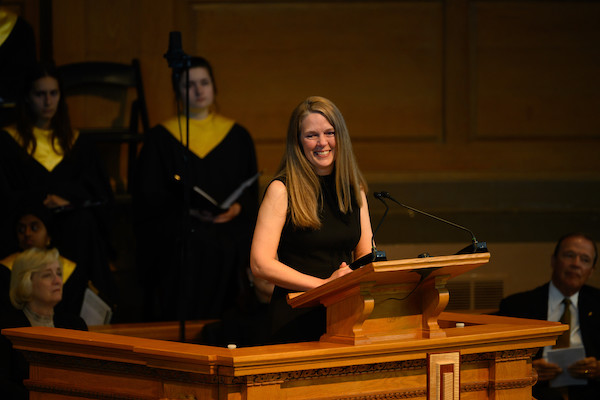
Laurie Turnage Wilson
And books and movies. My father loved books and movies, and having him read to us as a child was magical. I wish children today knew how exciting it could be to sit down on the couch with your father and listen to him read a Hardy Boys mystery.
And on those trips my mom did not have to share my dad with Wake Forest. My father said he married my mom, whom he described as the forthright Emily Herring of Columbus, Georgia, because he knew he would never be bored. And he never was. She tried to make his life happy until the very end, and she succeeded.
My sisters also benefited from my father’s wisdom.
Julie remembers a time when she was trying to figure out how to combine her love of writing with her interest in social justice. Dad went with her to visit an after school creative writing program in the Mission district in San Francisco. When Julie finished, they ate Italian food in North Beach and reflected on their experiences and what Julie might do.
Sally remembers that she was going to meet my dad in Paris when she was 20. He gave her the name of the hotel and expressed no doubt that she would find it. This was before cell phones. After eating an omelet for lunch and going to the Musee d’Orsay they went to see Crossing Delancey which is still one of Sallys favorite movies.
My sisters both liked how my dad stretched himself to experience current events and movies and usually had a list in his pocket of missing books he was searching for or plays or movies he wanted to see.
On one of my last trips with Dad, we flew to Little Rock to visit the Clinton library, then went to College Station Texas to see the Bush Library, and then to Austin to see the LBJ Library. We particularly enjoyed going to the LBJ ranch.
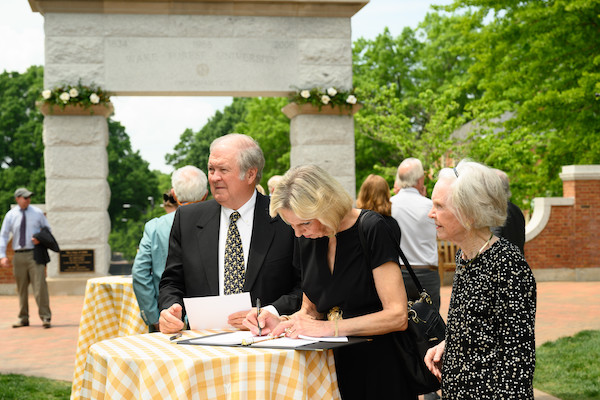
Then we went to Archer City, Texas, where the writer Larry McMurtry had a book store. Many of McMurtry’s books were set there and the movie The Last Picture Show was filmed there. We went to the Dairy Queen where another of McMurtry’s books is set, and I watched my dad eat the most disgusting footlong chili dog I have ever seen. Every bite. That night we stayed at the Lonesome Dove Inn.
There is a scene in the book Lonesome Dove where Gus is talking to Lorie. He is an old cowboy and she is a young woman who thinks everything will be fine if she can just get to San Francisco. Gus is in love with her. Finally he says:
“Lorie, darlin’, life in San Francisco, you see, is still just life. If you want any one thing too badly, it’s likely to turn out to be a disappointment. The only healthy way to live life is to learn to like all the little everyday things…”
My father got to be 101 by enjoying the little things in life. It helped that he never had a cell phone or did his own email, or, Heaven forbid, social media.
He lived each day visiting with you, reading on the porch or in front of the fire, enjoying a movie, or playing charades, and watching a basketball game with my mother.
And he also lived that long because he had been kind to people and they, in turn had been kind to him. Most importantly, he also had a pretty clear conscience knowing that he had tried to live a life of honor.


